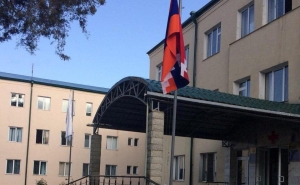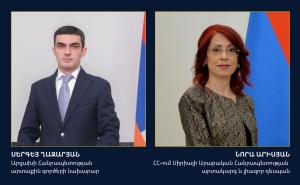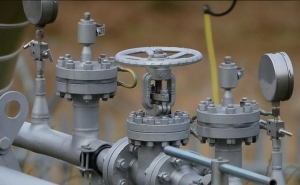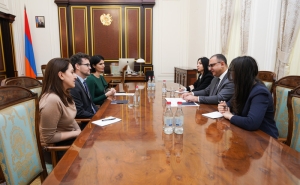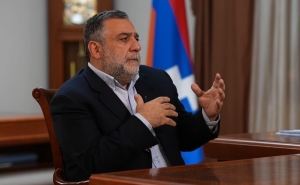 Minsk Group Co-Chairs Look for Alternatives
Minsk Group Co-Chairs Look for Alternatives
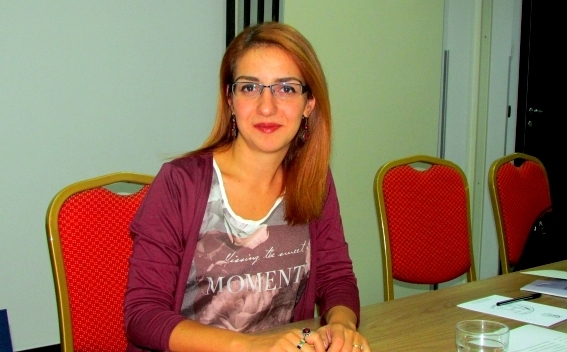
Judging from the announcements made during the latest regional trip, the OSCE Minsk Group Co-Chairs look for new confidence-building measures and ways to move forward in the negotiations.
The violation of the ceasefire regime exactly during the time of the observation conducted by the Co-Chairs was another proof that their “balanced” announcements and calls have no results, and there is a lack of political will for the peaceful settlement of the conflict.
Let’s refer to some of the points in the announcements made by the Co-Chairs during the visit:
Ceasefire Regime Violations: Security and the ceasefire regime violations were among the main issues discussed during the meetings of the Co-Chairs with the representatives of the conflicting sides. In spite of the ceasefire regime violations during the very time of their observation and fury of the American Co-Chair ( the US Co-Chair stated that it was awful and unacceptable), the Co-Chairs again stated that it was impossible to determine the location of the fire and indicate the guilty side. It’s difficult to imagine how it was not possible to determine the direction of the fire during observation and it’s even more difficult to understand how the mediators imagine preventing further ceasefire violations by such uncertain announcements.
It’s obvious that by such a behavior the Co-Chairs try to seem unbiased. Probably it will be possible to get rid of this ruining silence only after the establishment and implementation of the investigation mechanisms.
According to the Co-Chairs, the issue was discussed with the sides. The authorities of Armenia and NKR underlined the importance of these mechanisms in their public announcements, while Baku, according to Warlick, neither rejected, not accepted them.
The announcement made by Warlick, in which he stated that it was desirable that “the sides make a commitment to reject the use of heavy weapons, otherwise there is a risk of escalation” deserves particular attention. Perhaps, this can become a basis for a new measure of trust – new agreement between all the conflicting sides (including NKR) about the non-use of force. It will on the one hand help to prevent the ceasefire regime violations and loss of human lives. On the other hand, as an important tool in confidence-building it will boost the negotiations process.
Work with Society: the Co-Chairs during their visit to the region paid particular attention to the work with society. This was especially the case when they were in Azerbaijan. In their final statement the Co-Chairs also stated that they encourage the projects boosting communication between the Armenians and Azerbaijanis. Besides in Azerbaijan Warlick declared that he hoped that the Azerbaijani society will make its voice heard and will demand peaceful settlement of the conflict.
This proves that the Co-Chairs observe the lack of political will in the leaders to resolve the conflict in a peaceful way, especially in case of Azerbaijani leadership. The military rhetoric of the Azerbaijani authorities gradually increases, which makes the Co-Chairs only rely on public demand for peace in Azerbaijan.
On the other hand this is a voice of assistance to society and a particular message to the Azerbaijani leadership, who keep under pressure civil society actors and organizations cooperating and communicating with the Armenian sides.
Systematic (structural) negotiations: during their visit to the region the Co-Chairs once more referred to the suggestion made by OSCE Co-Chair Switzerland on conducting systematic (structural) negotiations.
This is an internationally accepted format, which assumes the negotiations among the representatives of the conflicting parties (on the level below presidents) on not major, secondary, mainly technical details. The mechanism allows the sides to come to an agreement around separate issues and to make progress in the negations process based on those agreements. In a sense this assumes parallel negotiation process along the one on the level of presidents.
This suggestion is also an attempt to overcome, to circumspect the problems that have become frozen during these 20 years and to come to an agreement at least on certain issues.
Interestingly this ides was referred to many times in 2014, but at least on the public level, did not receive reaction from the sides.
The causalities and tensions on the borders decrease the effectiveness of the negotiation process and trust among the sides. The primary problem of Co-Chairs today is to re-start negotiations and to come to an agreement on certain confidence- building measures. The statement on organization of the presidents’ meeting by the end of the year is conditioned by this very fact. The Co-Chairs are probably in a search for alternatives solutions to boost negotiation process.
However, as long as the mediators avoid making addressed statements, it is hard to expect from the Azerbaijani side to put aside its non-constrictive policy and demonstrate will for the political settlement of the conflict.
Other materials on this subject
- Russian forces have clearly failed in their duties: senators press Biden Administration to break Azerbaijan’s blockade The United States cannot stand aside while the Aliyev regime callously threatens the lives of Nagorno-Karabakh’s citizens, and must hold Azerbaijan to account for blocking a civilian population’s access...
- US calls for the full restoration of free movement through the Lachin Corridor "We remain concerned about impeded access to the Lachin Corridor and the humanitarian implications of this situation. This sets back the peace process and undermines international confidence. We call for...
- Azerbaijani forces violate the ceasefire in Artsakh The ceasefire violation was reported to the command of the Russian peacekeeping troops.
- Azerbaijani units violate ceasefire in several directions, Artsakh’s Defense Ministry says The Armenian side has no losses. The incidents of ceasefire violations were reported to the command of the Russian peacekeeping troops.
- Russian Diplomat Reassures Armenians Over Corridor In Karabakh "The parties are in direct contact, and I assure you that the peacekeepers will not move a single centimeter until there is a new corridor," Seleznyov said.
-
 17:08
17:08The regular session of the Anti-corruption Policy Council takes place in Jermuk
-
 15:05
15:05The Prime Minister sends congratulatory messages to the supreme leader of Iran and the President of Iran
-
 11:11
11:11Armenia sends earthquake aid to Turkey
-
 10:43
10:43Commemoration of the Pontiff St. Sahak Partev
-
 09:16
09:16Some roads are closed and difficult to pass in Armenia
-
 19:55
19:55Phone conversation of the Foreign Minister of Armenia with the U.S. Assistant Secretary of State for European and Eurasian Affairs
-
 18:30
18:30Prime Minister Pashinyan and President Khachaturyan meet
-
 18:20
18:20Ararat Mirzoyan with Co-Chairman of the OSCE Minsk Group of France Brice Roquefeuil
-
 17:01
17:01Humans could land on Mars within 10 years, Musk predicts
-
 16:45
16:45France, US urge 'immediate' end to Nagorno Karabakh blockade
-
 16:01
16:01Blockaded Nagorno Karabakh launches fundraiser to support quake-hit Syria
-
 15:59
15:59Earthquake death toll in Turkey rises to 18,342
-
 15:43
15:43Ararat Mirzoyan Held a Telephone Conversation with Sergey Lavrov
-
 15:06
15:06French president rules out fighter jet supplies to Ukraine in near future
-
 14:47
14:475 Day Weather Forecast in Armenia
-
 14:44
14:44President Vahagn Khachaturyan wrote a note in the book of condolences opened in the Embassy of Syria in Armenia
-
 14:20
14:20Azerbaijan’s provocations impede establishment of peace and stability – Armenian FM tells Russian Co-Chair of OSCE MG
-
 12:57
12:57France representation to OSCE: Paris calls on Azerbaijan to restore freedom of movement through Lachin corridor
-
 11:40
11:40Command of Kosovo forces highly appreciated preparation of Armenian peacekeepers
-
 10:16
10:16The United States withdrew from sanctions against Syria for six months the provision of assistance after the earthquake
day
week
month
Humidity: 32%
Wind: 3.6 km/h



